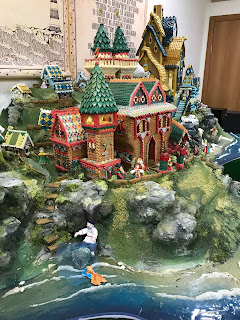Saturday, July 6th, Douglas and I joined some other Consulate staff to celebrate Ivan Kupala Night. It was held at the charming
Usadba Vavilovo. (For better pictures than mine, look it up on line.)
Ivan Kupala is
a mid-summer festival that, depending on what you read, celebrates the summer
solstice, the summer fertility god or the wedding of sun and water. Tossing
water about is part of the mischief associated with Ivan Kupala. I was grateful
that there was none of that at this event, as it was just a teensy bit chilly.
We started by
looking at a cottage full of gingerbread houses, always on display at Usadba
Vavilovo. They’re designed to portray scenes from various Pushkin fairy tales.
This whetted my appetite for reading them, as I could only recognize one story
in all the scenes.
At the
entrance is a tiny cafe with a bakery where we bought pastries, cookies and
cakes. Just outside that was a small smoking area. There was no smoking in the
large, garden area which made the evening very comfortable. Since we didn’t
have to breathe cigarette smoke, we could small the shashlik (marinated, spiced meat often on skewers) cooking. We were
getting hungry and saw a few people eating, but none of us could politely find
out how to get some for ourselves!
When we
entered the main garden area, the women were given ribbons tied to our wrists. (It
was definitely a female-centered celebration.) Women of all ages and marital
status wore garlands or wreaths on their heads, though it’s my understanding
that this was traditionally done by younger, single women. I had to check my
attitude seeing the older women wearing wreaths, but by the end of the evening,
I got caught up in all the festivities and was planning my wreath for
next year.
A group of
musicians helped me get into the spirit of Kupala. They took the stage, then
strolled and played and sang. There were about six singers and players. I think
they all sang, plus one man played tirelessly on an accordion, another played
an instrument that looked like a small recorder, but had a reedy sound and another
played various rhythms. I wish I could tell you more about them, but they
started to play, and they played non-stop for about two and a half hours, at which
time we were ready to leave. They coaxed people up to dance. Mostly women
responded, but there were some men willing to dance with the lovely women.
The dancing went on for about an hour and a half. Some of the dances were
little more than holding hands and threading in and out in circular patterns,
but some were more involved. The players spent enough time to allow everyone to
catch on to the steps before changing the dance. Douglas and Mike were pulled
into a dance that involved some cheek-kissing. They were both teased about the
lipstick left behind from all those lips!
There was a wreath competition, but, as I watched woman after woman go up and receive a prize, it seemed to me that everyone who wore a garland or wreath got a prize. Afterwards, some women cast their wreaths into the water that flowed into pools in the
center of the garden. Traditionally, single women did this to read the petal
patterns on the water to discern their romantic future. Sometimes, men would
pull a wreath from the water to get the attention of the woman who’d cast it
off.
The women were
called to take off the ribbons we’d been given and tie them to a bunch of
branches that were to be burned. This symbolized the burning of our worries and
problems. After they were ablaze, people lined up and jumped over the flames. This
is interpreted as bringing good fortune, longevity or to test a relationship—
it is said that a couple who fails to make the jump while holding hands will
not last in love. (Hopefully I'll be able to post either a picture or short video of this soon.)
We were guests
this year and paid no admission. Next year, I’d gladly pay to attend. I’d be
ready to dance more, stay longer so I can talk with the musicians and find out
how to score some shashlik.





No comments:
Post a Comment